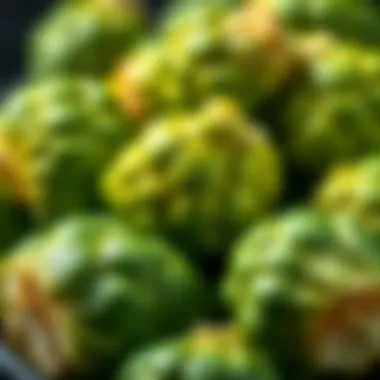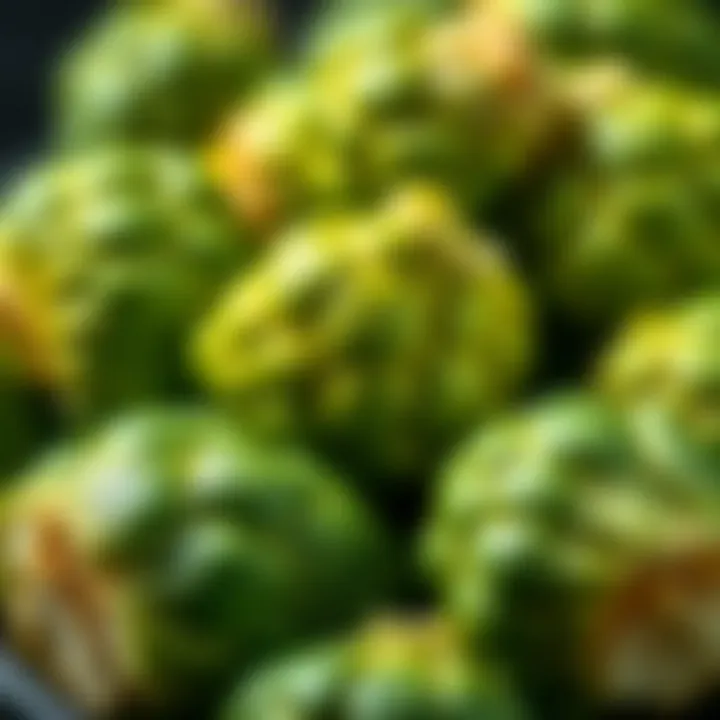Nutritional Value of Brussels Sprouts: A Detailed Insight


Intro
Brussels sprouts often find themselves in the spotlight of culinary discussions, yet their impressive nutritional profile deserves more than just a nod. These mini cabbages may be small, but they pack a punch when it comes to vitamins, minerals, and health benefits. Understanding the value they bring to a balanced diet can transform the way you think about your meals.
Their distinct flavor and texture not only elevate dishes, but they also contribute to overall wellness. Whether you're tossing them in a salad, roasting them to perfection, or using them as a side dish, Brussels sprouts are versatile and rich in nutrients. This article provides a deep dive into their nutritional value, preparation methods, dietary considerations, and how to incorporate them into your diet with ease.
As we explore their ingredients, cooking techniques, and variations, we aim to illuminate the many facets of Brussels sprouts, making them an indispensable part of your culinary repertoire.
Foreword to Brussels Sprouts
Brussels sprouts often sit on the dinner plate like an unassuming guest at a festive gathering, sometimes overlooked and rarely the center of attention. Yet, these small green orbs pack a nutritional punch that's hard to ignore. This article will unravel the layers of Brussels sprouts, revealing their myriad benefits and culinary versatility, making the case for why they deserve a more prominent place at our tables.
From childhood memories of being told to clean your plate to adult realizations of their health contributions, Brussels sprouts have a rich narrative woven into our dining habits. They are not just another side dish but a powerhouse of nutrients that can enhance overall well-being. Thoughtful incorporation of such vegetables can lead to a more balanced diet and spark creative cooking endeavors.
Brussels sprouts belong to the cruciferous family, which includes broccoli, cauliflower, and kale. This group is known for its cancer-fighting properties and plethora of vitamins. In simple terms, eating Brussels sprouts can be like getting armor for your body against various health issues.
Additionally, understanding the historical journey of Brussels sprouts provides insight into how they emerged and garnered appreciation. From ancient farming to modern kitchens, they have adapted, evolving into a staple favored by many.
Brussels sprouts are not only significant for their nutrition; they also challenge our culinary skills. Preparing them in engaging ways can turn a simple meal into something extraordinary. As such, this article aims to provide a comprehensive overview of this often misunderstood vegetable.
In the sections that follow, readers will discover details on their nutritional breakdown, from caloric content to the vitamins and minerals they harbor, along with health benefits that extend beyond basic description. The aim here is to celebrate Brussels sprouts for what they are: a nutritious marvel that holds the potential to transform our understanding of healthy eating.
“In every sprout, there's a story waiting to unfold, a testament to the balance of flavor and nutrition.”
Keywords:
- Brussels sprouts benefits
- Nutritional value
- Healthful vegetables
- Cooking techniques
Historical Context of Brussels Sprouts
Brussels sprouts, a cruciferous vegetable, have a long and storied history that traces back to ancient times. The origins of these little green gems can be tracked to the Mediterranean region, with early signs of cultivation appearing in ancient Rome. Historical records suggest that they were popularized in Belgium during the 16th century, where they garnered the name ‘Brussels sprouts.’ This veggie not only has deep roots but also tells a fascinating story of adaptation and culinary evolution.
The significance of studying the historical context of Brussels sprouts lies in understanding how they evolved into a staple in many diets today. Originally grown for their high nutritional content and resilience, Brussels sprouts were farmer-friendly; they could thrive in cooler temperatures, providing sustenance during winter months. This made them not only prized for their nutrition but also valuable for food security.
"Brussels sprouts were not just a side dish; they represented a way of survival in the harsh winters of medieval Europe."
As time progressed, these sprouts migrated across Europe and eventually made their way to other parts of the world, especially North America, where they became a beloved staple. In the U.S., their popularity surged around the 20th century. The post-war dining boom led to an increased appreciation for vegetables and healthier diets.
Cultural Importance
The historical journey of Brussels sprouts can't be discussed without touching on their cultural importance. In many European countries, especially Belgium and the Netherlands, they are celebrated in traditional dishes, often included in festive meals. Their unique flavor and nutritional benefits also played a role in shifting perceptions about vegetables, particularly in modern health-conscious diets.
Culinary Evolution
The culinary use of Brussels sprouts has evolved significantly over the years. Initially prepared in simple ways, such as steaming and boiling, new cooking techniques have brought them into the spotlight. Now, you might find them roasted with garlic, sautéed with balsamic glaze, or even used in salads, showcasing their versatility. This evolution reflects broader trends in cuisine, emphasizing creativity while maintaining nutritional integrity.
Through this historical lens, Brussels sprouts symbolize not merely a vegetable, but a testament to how food can adapt, survive, and flourish through the ages. The transformations over centuries mirror changes in dietary habits, health awareness, and culinary trends, connecting past practices with present-day culinary arts.
Botanical Classification
Understanding the botanical classification of Brussels sprouts offers invaluable insight into their nature and relationship within the plant kingdom. These small, leafy buds belong to the family Brassicaceae, a group that also includes vegetables such as cabbage, broccoli, and kale. This classification not only provides context but highlights the distinct characteristics and benefits these vegetables share.
Importance of the Family Brassicaceae
Plants within the Brassicaceae family are renowned for their diverse health benefits. They contain several compounds that are recognized for promoting human health, including glucosinolates and various vitamins. These components are often studied for their anti-cancer properties. The link between Brussels sprouts and other cruciferous vegetables enhances their reputation in nutritional science. Eating a variety of these vegetables can contribute to a greater intake of essential nutrients and compounds that support health.
Genus and Species Identification
In scientific terms, Brussels sprouts are classified as Brassica oleracea, var. gemmifera. The designation follows a hierarchy that helps researchers, gardeners, and food enthusiasts alike understand and categorize these vital crops. The species Brassica oleracea encompasses several vegetable forms, from those producing leafy greens to those like Brussels sprouts that develop buds along a central stem.
- Variety: The term gemmifera indicates that these plants are particularly cultivated for their edible buds, which are known to be packed with nutrients.
Cultivation Considerations
Knowing where Brussels sprouts fit within the botanical landscape affects how we cultivate and prepare them. Their growth requires specific climates and conditions, thriving in cooler temperatures while resisting pests that may affect other plants. Understanding their classification helps in selecting the right planting strategies, ensuring optimal growth conditions.
The development of Brussels sprouts involves a careful process from germination to harvest, which indicates the importance of their classification within horticulture. Each variety might also have individual traits that suit different climates or culinary applications.
"Understanding plant taxonomy enriches our approach to consumption and appreciation of vegetables like Brussels sprouts."
Finale
Delving into the botanical classification of Brussels sprouts reveals essential information about their nutritional potential and agricultural considerations. As part of a larger family, they serve as an excellent source of vitamins and minerals while contributing to diverse dietary patterns. By knowing the complexities of their classification, food lovers can better appreciate the unique contributions of Brussels sprouts to health and flavor.
Nutritional Overview
Brussels sprouts are often tossed into the spotlight for their dense nutritional profile. These little cabbages pack a punch, offering a blend of vitamins, minerals, and bioactive compounds that contribute to overall health. What's intriguing about Brussels sprouts is their versatility in catering to different dietary needs, making them a worthy addition to numerous meals. In this section, we will break down the caloric content, macronutrients, and micronutrients of Brussels sprouts, providing a well-rounded understanding of their place in a healthy diet.
Caloric Content
Brussels sprouts are quite low in calories, with about 38 calories per 100 grams. This feature makes them an excellent choice for those keeping an eye on caloric intake while still aiming for nutritional richness.
- Low caloric density allows generous servings without wrecking your daily caloric goals.
- Incorporating this vegetable can boost satiety while supporting weight management.
Macronutrients
Proteins
Proteins from Brussels sprouts contribute to muscle repair and growth, making them a solid plant-based protein choice. Each serving has about 3.4 grams of protein per 100 grams, which might not seem like a lot, but in the scope of vegetable sources, it stands out.


- Key Characteristic: The protein is of vegetable origin and can complement other protein sources in meals.
- Unique Feature: Contains essential amino acids, albeit in lower levels compared to animal proteins. This helps vegetarians and vegans meet their protein needs while mixing with other sources for a complete profile.
Fats
Brussels sprouts contain a trivial amount of fat, approximately 0.3 grams per 100 grams. While it’s not a significant portion, the fats present are healthy unsaturated fats.
- Key Characteristic: The minimal fat content makes them suitable for low-fat diets.
- Unique Feature: Comprising primarily of polyunsaturated and monounsaturated fats, these fats have been associated with heart health benefits, simply because they help to lower bad cholesterol levels when coupled with a balanced diet.
Carbohydrates
Carbohydrates are present as complex carbs, chiefly starch and fiber, offering roughly 8 grams per 100 grams serving.
- Key Characteristic: The fiber in Brussels sprouts aids in promoting digestive health and regulates blood sugar levels.
- Unique Feature: Fiber not only helps digestion but also keeps you feeling fuller longer, making Brussels sprouts a supportive food for those managing their weight.
Micronutrients
Vitamins
Brussels sprouts are incredibly rich in vitamins, most notably Vitamin K and Vitamin C.
- Key Characteristic: High Vitamin K content is vital for blood clotting and bone health. Regular consumption can positively impact bone density and reduce the risk of fractures.
- Unique Feature: Contains a variety of B vitamins such as folate, which are essential for energy metabolism and overall cellular function.
Minerals
Brussels sprouts are a minor source of several important minerals, including potassium, calcium, and iron.
- Key Characteristic: Potassium plays a crucial role in regulating blood pressure, whereas calcium is key for bone integrity.
- Unique Feature: The balance of these minerals helps in various bodily functions, aligning well with dietary recommendations for maintaining a healthy lifestyle.
"Eating your greens can often influence not only your physical health but also your mental wellness, and Brussels sprouts offer a great pathway to both."
In summary, the overall nutritional profile of Brussels sprouts showcases them as a formidable contender in the vegetable category. With an impressive amount of vitamins, minerals, and protein, they are a fantastic addition to any diet.
Vitamins and Health Benefits
Brussels sprouts are not just a culinary delight; they also pack a punch when it comes to vitamins and health perks. The various vitamins these tiny cabbages bring to the table play crucial roles in promoting health, supporting bodily functions, and warding off diseases. Their inclusion in meals contributes to a nutrient-rich diet, showcasing the importance of these vegetables in modern nutrition. From bolstering our immune system to supporting bone density, understanding the health benefits of Brussels sprouts can encourage individuals to incorporate this vegetable more often into their meals.
Vitamin K Content
Role in Bone Health
Vitamin K found in Brussels sprouts plays an essential role in maintaining bone health. One critical aspect of Vitamin K is its participation in the synthesis of osteocalcin, a protein that helps bind calcium to the bone matrix. This process is vital as stronger bones mean a lower risk of fractures as we age. The distinct characteristic of Vitamin K in Brussels sprouts is its ability to work in synergy with calcium and Vitamin D, enhancing bone density in ways that are highly valuable for overall skeletal health.
Including Brussels sprouts in your diet can serve as a beneficial choice for those looking to enhance their calcium absorption and maintain strong bones. However, it’s important to remember that relying solely on one source of any nutrient isn't sufficient; a balanced approach to nutrition is key. The unique feature of Vitamin K in these sprouts is the freshness—when consumed raw or lightly cooked, they retain more of this vital nutrient, ensuring maximum effectiveness.
Impact on Blood Clotting
Vitamin K is also known for its significant role in blood clotting. This vitamin assists in the formation of clotting factors, which are proteins that help control bleeding by allowing blood to coagulate. This characteristic makes Vitamin K an integral component in preventing excessive bleeding during injuries. Integrating Brussels sprouts into a balanced diet can thus be a smart move, particularly for individuals prone to blood coagulation issues or those recovering from surgery.
It’s also worth noting that while excessive blood clotting can lead to serious health issues, a deficiency in Vitamin K can increase bleeding risk. This dual behavior showcases the complexity of nutrition and the balance needed in our diets. Brussels sprouts contribute to regular intake, helping to maintain that delicate balance.
Vitamin Contribution
Role in Immune Function
Vitamin C, often touted for its immune-boosting properties, is another vital component in Brussels sprouts. This vitamin supports various immune functions, including the stimulation of the production of white blood cells. These cells are essential in defending the body against pathogens. One key aspect of Vitamin C’s role in immune function is its antioxidant capability, saving cells from damage caused by free radicals during infections.
The presence of Vitamin C in Brussels sprouts makes them a popular choice for people looking to bolster their immune system naturally. There is a unique feature of this vitamin that is often overlooked—its ability to enhance the absorption of iron from plant-based foods. This synergy is crucial, especially for vegetarians seeking to include sufficient iron in their diets.
Antioxidant Properties
In addition to supporting the immune system, Vitamin C is rich in antioxidants. These antioxidants combat oxidative stress, which has been linked to numerous chronic diseases, including heart disease and certain forms of cancer. The vibrant green color of Brussels sprouts is a testament to their rich content of beneficial compounds overall.
Including these sprouts as part of your regular consumption can serve as a naturally delicious way to harness antioxidant properties through food. Another unique aspect is that fruits and vegetables containing Vitamin C, like Brussels sprouts, are not only about reducing risk; they also promote healthy aging by maintaining skin elasticity and reducing wrinkles.
"Eating Brussels sprouts regularly can not only improve vitamin intake but also provide long-term health benefits, making them a wise addition to a balanced diet."
In summary, the vitamins found in Brussels sprouts play significant roles in maintaining our health. From supporting bone density to enhancing our immune response, incorporating these vegetables into our diet contributes to overall wellness. It's about understanding their unique benefits and integrating them along with other nutritious foods to achieve a well-rounded diet.
Minerals Present in Brussels Sprouts
Brussels sprouts boast more than just their unique flavor and dynamic texture; they are also a treasure trove of essential minerals that play critical roles in maintaining health. By incorporating Brussels sprouts into your diet, you're not only indulging in something delicious but also fortifying your body with vital nutrients. This section will delve into the specific minerals present in Brussels sprouts—calcium, iron, and potassium—each offering distinct benefits and considerations for your health.
Calcium
Calcium is often associated with strong bones and teeth. In Brussels sprouts, this mineral plays a significant role in maintaining skeletal integrity and preventing conditions like osteoporosis. A serving of these little green buds provides about 37 milligrams of calcium, which contributes to roughly 3-4% of the average adult’s recommended daily intake.
Despite their modest calcium content, Brussels sprouts can be part of a broader dietary strategy to ensure sufficient intake, especially for those who might not consume dairy products. Adding these sprouts to meals not only enhances flavor but also helps in achieving daily calcium goals.
Some important functions of calcium include:
- Muscle Function: Helps in muscle contraction and relaxation.
- Nerve Transmission: Aids in transmitting signals between the brain and the body.
- Blood Clotting: Critical for the blood coagulation process.
Iron
Iron is essential for producing hemoglobin, the protein in red blood cells that carries oxygen throughout the body. Inadequate iron levels can lead to fatigue and decreased immunity. Brussels sprouts contain about 1.2 milligrams of iron per serving, making them a good, albeit not singular, source of this crucial mineral.
What’s more, the iron from Brussels sprouts is best absorbed when paired with vitamin C. Luckily, these sprouts are also rich in vitamin C, thus creating a synergy that enhances iron absorption. This is particularly beneficial for vegetarians and vegans who may find it challenging to meet their iron needs through diet alone. Consider these key points about iron:
- Role in Energy Levels: Aids in energy production and metabolism.
- Immune Support: Essential for a healthy immune response.
- Cognitive Function: Supports brain health and function.


Potassium
Potassium is another important mineral found in Brussels sprouts, with a content of about 504 milligrams per serving. This mineral is vital for several physiological processes, including maintaining fluid balance, regulating blood pressure, and supporting muscle function.
Adequate potassium intake can mitigate the risk of stroke, prevent kidney stones, and decrease bone loss as one ages. Given the modern diet tends to be high in sodium, incorporating potassium-rich foods like Brussels sprouts is a natural way to keep that balance in check. Essential benefits of potassium include:
- Blood Pressure Regulation: Helps counteract the effects of sodium.
- Muscle Cramps Prevention: Aids muscle contraction and thus reduces cramping during activity.
- Heart Health: Vital for proper heart function and rhythm.
In summary, Brussels sprouts are more than just a side dish— they are a nutritional powerhouse that introduces essential minerals like calcium, iron, and potassium into your diet. Their benefits extend beyond mere consumption, impacting various bodily functions and promoting overall health.
Bioactive Compounds
The realm of Brussels sprouts extends beyond mere vitamins and minerals. One of the standout aspects is the presence of bioactive compounds, which play a crucial role in promoting health and well-being. These compounds are natural substances found in Brussels sprouts that exert significant physiological effects. Understanding these elements allows us to appreciate the full nutritional value of this vegetable.
Bioactive compounds can potentially improve health outcomes and may alter the course of certain diseases. They work synergistically with the vitamins and minerals present, enhancing their benefits and supporting various bodily functions. Two significant types of bioactive compounds found in Brussels sprouts are antioxidants and glucosinolates.
Antioxidants
Brussels sprouts are brimming with antioxidants, which act as the body’s defense against oxidative stress. Oxidative stress arises from an imbalance between free radicals and antioxidants in the body. This stress has been implicated in numerous chronic diseases, including heart disease, diabetes, and cancer. By counteracting free radicals, antioxidants help to reduce inflammation and tissue damage.
In Brussels sprouts, the key antioxidants include vitamin C, beta-carotene, and quercetin. The presence of these compounds can significantly be beneficial:
- Vitamin C: Enhances immune function and promotes skin health.
- Beta-carotene: Converts to vitamin A, supporting eye health and immune response.
- Quercetin: Known for its anti-inflammatory properties, can help stabilize blood pressure and improve heart health.
"Consuming a diet rich in antioxidants may assist in preventing oxidative damage and reducing the risk of chronic diseases."
This amalgamation of antioxidants in Brussels sprouts showcases why they deserve a regular spot on your plate. Eating these vegetables may help keep the aging process at bay while fortifying the body’s overall defenses.
Glucosinolates
Another remarkable bioactive compound found in Brussels sprouts is glucosinolates. These sulfur-containing compounds are responsible for the distinct flavor of cruciferous vegetables and have been linked to numerous health benefits. When Brussels sprouts are chopped or chewed, glucosinolates convert into active compounds such as isothiocyanates, which have been studied for their anticancer properties.
Research indicates that glucosinolates may help:
- Induce detoxification enzymes, enhancing the body's ability to eliminate harmful substances.
- Exhibit antimicrobial activity, potentially protecting against infections and harmful bacterial growth.
- Offer protection against certain types of cancer, particularly colorectal and breast cancer, by blocking carcinogens and reducing inflammation.
While overcooking can diminish the levels of these beneficial compounds, opting for cooking methods like steaming or roasting at moderate temperatures can help preserve their potency.
Health Benefits Beyond Nutrition
When discussing Brussels sprouts, it’s easy to focus solely on their nutritional components, such as vitamins, minerals, and fibers. However, there are health benefits that stretch beyond the mere numbers on a nutrient label. Eating Brussels sprouts can play a vital role in preventing various chronic conditions, supporting heart health, and potentially reducing the risk of certain cancers.
Brussels sprouts are a rich source of health-promoting compounds that work in synergy with a balanced diet. And while they sit in kitchens often overlooked, their contribution to overall wellness is remarkable and well worth a closer look.
Heart Health
In the realm of cardiovascular wellness, Brussels sprouts shine brightly. These little green veggies are loaded with fiber, which is instrumental in maintaining heart health. But it’s not just fiber that does the trick. Their high concentration of antioxidants—like vitamins C and E—help in combating oxidative stress. This stress, fueled by free radicals, can severely damage cardiovascular tissues, potentially leading to heart disease.
Moreover, Brussels sprouts contain compounds called glucosinolates. These can break down into isothiocyanates upon digestion, showcasing protective effects against atherosclerosis. Atherosclerosis is a condition characterized by the hardening of arteries, which can, in time, lead to heart attacks or strokes. It's like having your own internal bodyguards working tirelessly to fend off potential threats.
"Regular consumption of Brussels sprouts may keep your heart in check by supporting healthy cholesterol levels and reducing blood pressure."
Incorporating Brussels sprouts into your meals may encourage a reduction in bad cholesterol levels (LDL), while helping raise good cholesterol (HDL). Just think of them as tiny defenders looking to maintain a balance that benefits your heart.
Cancer Prevention
The notion that certain foods can combat cancer is increasingly gaining traction in nutritional science, and Brussels sprouts are right at the forefront of this discussion. They've shown promise in research linking cancer prevention to their phytochemical content. Specifically, their ability to enhance the body's detoxification processes is noteworthy.
Brussels sprouts are not just a simple side dish; they contain potent antioxidant properties, which can help fight off the formation of cancer cells. The isothiocyanates mentioned earlier play a crucial part in this. They have exhibited potential in inhibiting the growth of tumors and inducing cancer cell death in various studies.
Moreover, the fiber content in Brussels sprouts can be a game changer when it comes to colon cancer. Fiber is known for promoting healthy digestion and preventing constipation. By maintaining a healthy digestive tract, Brussels sprouts might provide a sanctuary against colon cancer. Every bite contributes to an environment that could keep cancer at bay.
In summary, the benefits of Brussels sprouts stretch far beyond their nutritional profile, encompassing crucial advantages for heart health and potential protection against cancer as well. For those who aim to enhance their well-being through diet, these vegetables can be an essential part of the puzzle.
Potential Drawbacks
While Brussels sprouts offer many nutritional benefits, it’s essential to consider their potential drawbacks. Understanding these can help consumers appreciate not just the positives but also the full spectrum of effects that these vegetables can have on one's health. Like any other food, consuming Brussels sprouts comes with its own set of considerations.
Digestive Issues
One of the most commonly reported issues with Brussels sprouts relates to their impact on digestion. These little green treasures are packed with fiber, which is fantastic for gut health, but for some, it can lead to discomfort.
The reason lies largely in the complex carbohydrates they contain, particularly oligosaccharides, which are notorious for causing gas and bloating in certain individuals. Especially if someone isn’t used to a high-fiber diet, the sudden introduction of Brussels sprouts can lead to bloating and excess gas. To mitigate this, it is wise to incorporate these vegetables gradually into one's diet, allowing the digestive system to adapt.
Working through moderate amounts – perhaps starting with a few roasted Brussels sprouts rather than heaping piles – often helps ease the transition. Cooking techniques can also make a difference; steaming and sautéing can soften those fibrous components, making them easier to digest than raw consumption.
"Moderation is the key, and listening to your body can make all the difference when attempting to incorporate Brussels sprouts into your meals."
Thyroid Considerations
Another aspect worth noting involves Brussels sprouts' relationship with thyroid function. These cruciferous vegetables contain goitrogens, substances that can interfere with thyroid hormone synthesis in some cases. While this might sound alarming, it's crucial to understand the context.
Most people can enjoy Brussels sprouts without any adverse effects on their thyroid health, especially when consumed as part of a varied diet. Yet, those with existing thyroid conditions – like hypothyroidism – may need to be more cautious. Cooking Brussels sprouts typically diminishes goitrogenic activity, which helps minimize the potential impact on thyroid function.
For someone already managing a thyroid condition or on medication, it’s advisable to consult a healthcare provider or a nutritionist. This ensures that Brussels sprouts can be enjoyed safely alongside other nutrient-rich foods, without compromising thyroid health.
In sum, while Brussels sprouts are indeed healthful, awareness of their potential drawbacks enriches one's dietary choices. By balancing intake and taking appropriate precautions, individuals can savor these veggies without concern.
Culinary Uses of Brussels Sprouts


Brussels sprouts are not just a side dish; they bring a lot to the table, both nutritionally and culinarily. Their unique flavor profile allows for a diverse range of cooking techniques, contributing to their ever-growing popularity in kitchens around the globe. Understanding how to cook these little green gems can significantly enhance their taste and nutritional value, making them an integral part of various dishes.
Preparation Techniques
Roasting
Roasting Brussels sprouts is arguably one of the most popular methods, and for good reason. When you roast them, you're essentially caramelizing their natural sugars, which brings out a delightful sweetness that's hard to resist. The high heat of roasting creates a crispy, golden-brown exterior while keeping the inside tender. This method can easily elevate a simple dish into something extraordinary. A standout feature of roasting is the deep, nutty flavor it imparts, which pairs beautifully with a hint of balsamic vinegar or a sprinkle of Parmesan cheese.
However, one might want to keep an eye on the clock; over-roasting can lead to bitterness, stripping away their gently sweet essence. It's a delicate balance, but one that rewards the patient cook.
Steaming
Steaming Brussels sprouts is one of the healthiest ways to prepare them. This method preserves their vitamins and minerals better than many cooking techniques. By allowing the steam to do the work, you ensure that the sprouts maintain their vibrant green color and crisp texture, which makes for an appealing plate.
A notable advantage of steaming is its ability to keep the natural flavors intact. Those who prefer a milder taste will appreciate this method, as it doesn’t add any additional fat or calories. However, for those seeking a punch of flavor, steamed Brussels sprouts might need a touch of seasoning or a drizzle of olive oil.
Sautéing
Sautéing Brussels sprouts is another quick and delicious way to prepare them. This method allows for excellent flavor infusion, especially when combined with garlic or shallots. A key characteristic of sautéing is the rapid cooking over high heat, which helps in achieving a tender-crisp texture. The result is a warm side that retains a slight snap with every bite, making it a delightful companion to any main course.
One unique feature here is the versatility this technique offers; you can toss in other vegetables, meats, or grains for a complete meal. Yet, caution is warranted regarding cooking time, as sautéing for too long can lead to a soggy texture. The goal should be to achieve a golden hue while ensuring that the sprouts remain crisp and vibrant.
Pairing with Other Ingredients
Brussels sprouts can shine either on their own or alongside various ingredients. Their slight bitterness complements rich flavors exceptionally well, making them a perfect match for ingredients like bacon, walnuts, and even citrus fruits. Here are some ideas that can inspire your culinary adventures:
- Savory Companion: Pair Brussels sprouts with bacon or pancetta for a classic flavor combination that many cherish.
- Nutty Addition: Toss in some toasted almonds or walnuts to add a delightful crunch.
- Fruity Twist: Incorporate pomegranate seeds or slices of orange for a refreshing fruity contrast.
Brussels sprouts' adaptability makes them a wonderful vegetable for experimenting in the kitchen, appealing to both traditional and adventurous palates alike. Understanding these techniques and pairings can truly bring out the best in Brussels sprouts, inviting them into both simple weeknight dinners and extravagant holiday feasts.
Storage and Shelf Life
Understanding how to properly store Brussels sprouts is crucial for maintaining their freshness, flavor, and nutritional value. With these petite vegetables becoming increasingly popular, it is essential to know how to handle them to maximize their shelf life. Proper storage conditions help to prevent spoilage, maintain crispness, and ensure that these delightful greens retain their health benefits, making them an excellent choice for health-conscious food lovers.
Optimal Storage Conditions
Storing Brussels sprouts isn’t as simple as tossing them in the fridge; a bit of care goes a long way. Ideally, they are best kept in the refrigerator, where the cool temperature can slow down their aging process. Here are some tips on how to store your Brussels sprouts effectively:
- Keep them unwashed: It’s better to store Brussels sprouts without washing them first. Moisture can promote rot. Rather, wash them just before you plan to prepare them.
- Use a breathable container: Place the sprouts in a perforated plastic bag or a cloth bag. This allows for airflow, which can help prevent excess moisture buildup.
- Store them in the crisper drawer: The vegetable crisper drawer in your refrigerator maintains a higher humidity level. This can help keep your Brussels sprouts fresh longer by preventing them from drying out too quickly.
- Keep away from ethylene-producing fruits: Some fruits, like bananas and apples, produce ethylene gas, which can speed up the ripening process in vegetables. Keep your Brussels sprouts away from these fruits to maintain their fresh qualities longer.
By following these storage techniques, you can elongate the life of your Brussels sprouts while preserving their crunch and flavor, letting you enjoy the nutritional bounty they offer for a longer time.
How Long Do They Last?
The shelf life of Brussels sprouts can vary depending on the storage method and their initial freshness. Generally, when stored correctly:
- Fresh Brussels sprouts can last about 3 to 5 days in the refrigerator. It’s always best to consume them within this timeframe for optimal taste and nutritional value.
- If you have leftover cooked Brussels sprouts, they can be stored in a sealed container in the fridge for 3 to 4 days.
It’s important to visually inspect the sprouts before use. If they start to develop a yellowish hue or become mushy, they may be past their prime, signaling that it's time to toss them out. Also, if you notice any strong or off smells, it’s best to discard them, as this could indicate spoilage.
Remember, quality matters. If they look good and smell fresh, chances are they’re still good to go!
In brief, knowing how to store Brussels sprouts properly and being aware of their shelf life can significantly enhance your culinary experience. Nutritious, versatile, and delicious, these small greens deserve a spot in your refrigerator and on your plate!
Fun Facts About Brussels Sprouts
Brussels sprouts might not seem like a thrilling topic at first glance, but there’s more to these little green veggies than meets the eye. Understanding some fun facts about Brussels sprouts can elevate your appreciation for them — not to mention your knowledge when chatting with fellow food lovers.
One interesting tidbit is that Brussels sprouts are actually closely related to cabbage, broccoli, and kale. They belong to the Brassica family, which is known for its edible vegetables packed with nutrients. This connection explains why they share some similar health benefits, but Brussels sprouts have their unique flair and advantages.
Did you know? The name "Brussels sprouts" comes from their strong association with Brussels, Belgium, where they were cultivated as early as the 13th century.
Another intriguing fact is that Brussels sprouts are more nutritious when they are harvested after the first frost. Cold weather helps to convert their starches into sugars, making them taste sweeter and less bitter, which often surprises those who've only thought of them as a dreaded side dish. So, timing really matters when it comes to harvesting these cruciferous vegetables.
When it comes to their appearance, it’s worth noting that Brussels sprouts grow on tall stalks—sometimes reaching up to three feet in height. This growth method is not only visually striking but also practical. It allows for easier harvesting and helps to protect the sprouts from pests that tend to thrive closer to the ground.
If you ever wonder about the diversity in varieties, you'll find that there are indeed many. The most common variety is the 'Jade Cross,' but others, such as the 'Gems' and 'Flea Market,' offer different flavors and textures. Each variety could give a new twist to your meals.
Here’s a brief list of some fun facts about Brussels sprouts to keep in mind:
- Nutrient Density: They’re loaded with vitamins, especially K and C, making them a smart addition to any diet.
- Sustainable Crop: Brussels sprouts are relatively easy to grow, and they can be cultivated in home gardens, which makes them a favorite for home cooks.
- Caloric Lowdown: With about 38 calories per cup, they are an excellent option for those looking to maintain a healthy weight without sacrificing flavor.
Understanding these fun facts infuses a sense of curiosity and relevance into the culinary scene where Brussels sprouts play a pivotal role. Not only do they offer a wealth of nutritional benefits, but they also come with an interesting backstory that can enrich your dining experience.
For more detailed information about Brussels sprouts, you might want to check resources like Britannica or Wikipedia which delve into their history and nutritional value. By exploring these facts, you might just find yourself looking at Brussels sprouts in a whole new light.
End and Final Thoughts
Brussels sprouts, often viewed as an unusual vegetable option, actually pack a significant punch when it comes to nutritional benefits. Their role in a balanced diet is not just a fleeting trend but a consistent recommendation from nutritionists and health enthusiasts alike. Understanding the intricacies of these little green gems can assist in making informed dietary choices.
The comprehensive exploration of the nutritional profile of Brussels sprouts presented in this article reveals their status as a superfood. Not just low in calories, they are rich in essential vitamins such as Vitamin K and C, which play crucial roles in bone health and immune function. Additionally, the presence of vital minerals like iron and potassium supports overall bodily functions and helps maintain optimal health.
Moreover, Brussels sprouts have bioactive compounds like glucosinolates, contributing to their potential health benefits, including cancer prevention and heart health. As you consider dietary options, acknowledging these benefits can encourage healthier eating patterns.
However, it’s essential to consider potential drawbacks. For some individuals, the fiber content might lead to digestive discomfort, especially if consumed in large quantities. Also, those with thyroid issues may need to be cautious about their intake due to the goitrogenic compounds found in brassicas, including Brussels sprouts. Understanding these considerations ensures a balanced approach when adding them to your meals.
In terms of culinary versatility, Brussels sprouts shine brightly. Whether roasted to perfection, steamed delicately, or sautéed for added flavor, they can be incorporated into various dishes. Pairing them with complementary ingredients further enhances their taste profile and nutritional impact.
To make the most of Brussels sprouts, proper storage is paramount. Keeping them in a cool, dark place maintains their freshness, and knowing when they’ve passed their prime can prevent waste and ensure that you are enjoying them at their best.
Ultimately, Brussels sprouts deserve a spot on your plate. They are more than just a side dish; they’re a powerhouse of nutrition that can elevate your meals while contributing to your health.
"Eating a varied diet rich in fruits and vegetables, including Brussels sprouts, is one of the best ways to promote health and longevity."
By integrating Brussels sprouts into your diet thoughtfully, you unlock a wealth of flavors and health advantages. Delve into the culinary possibilities and enjoy these nutritious vegetables as part of a holistic approach to well-being. Connect with communities and resources that celebrate healthy eating, such as Reddit's Food Subreddit or explore recipes at EatingWell.







